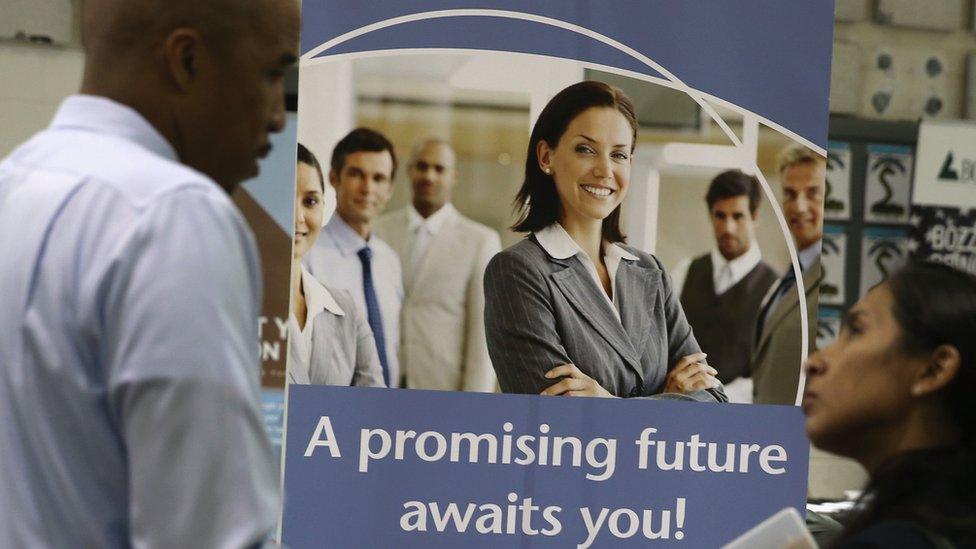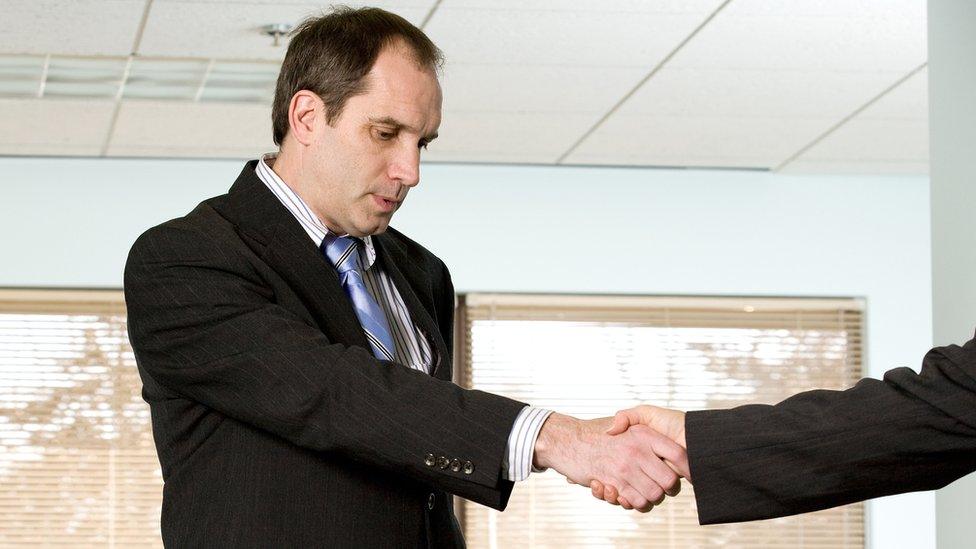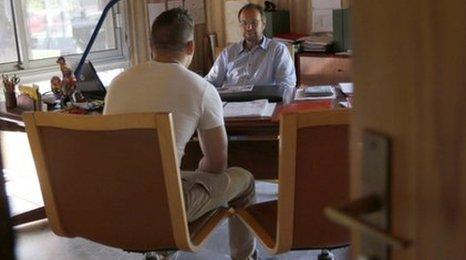Just the job? When interviews go wrong
- Published
"I was asked if I planned to have a baby in the next six months"
Ever had a job interview that seemed to have nothing to do with your ability to do the job? It appears that plenty of people can answer "yes" to that question.
Katherine Irvine was 37 when she went for a job as a recruitment consultant in Cornwall. She was shocked to find her interviewer was concerned that she was too old and wouldn't have the energy to do the role.
"It was a group interview and the interviewer commented that myself and one of the others were 'older'. There was a concern about us being able to work long hours."
She was then asked: "What do you think? Do you think you're too old?"

Katherine Irvine was quizzed about whether she was too old at 37 to be a recruitment consultant
Katherine was surprised at such open discrimination and informed the company's HR department who said they were "shocked".
Killer questions
Katherine is far from alone when it comes to such unexpected interview experiences. When we asked on the BBC News LinkedIn page, external, more than 1,500 of you contacted us with a whole range of questions deemed "inappropriate" and "outrageous" for a variety of reasons.
Mature student Kevin Helton told us: "The interviewer asked, 'You used to be in the Army, how many people have you killed?'
"My answer was, 'Depending on the outcome of this interview, the number might change.'"
Others have faced a grilling about their personal lives, particularly women of child-bearing age.
Francine is a high-flying solicitor now but when she first entered the job market and applied for a medical secretary role, she was asked if she was going to get pregnant and leave.
"I was 24 years old then and it was one of my first interviews. I turned down the job when they offered it to me."
Even just a year ago an interviewer asked her, "Are you Jewish?"
"In retrospect, I should have said that was none of your business," she says.

But first you have to get through the job interview
Marc Callow was shocked to be asked in an interview for a recruitment management position if he was gay. "I was that gobsmacked that I just replied 'yes'. I got the job but it was a portent to what the company was like."
Is this relevant?
These kinds of questions really have no place in a job interview, because there are laws against discrimination, as Peter Reilly, principal associate at the Institute for Employment Studies (IES), explains.
"In a legal sense, you have to be careful," he says. "You have to ask, is that relevant to the task? And if it's not, you shouldn't be asking it."
That goes for racial issues too. One person told the BBC: "The interviewer said he was surprised I was white because he thought my name sounded black."

Interview questions you should not be asked
Is English your first language?
Are you married?
Do you have children?
How old are you?
How many days were you off sick in your last job?
Do you have any criminal convictions?
What religion are you?
What are your sexual preferences?
Are you a trade union member?
Source: Reed.co.uk

Jo Foat knew the job interview wasn't going so well when the interviewer brought out a large straw hat.
"Put this hat over your face and tell me why I should give you a job," he said.
"Why do you want me to do that?" she said.
He replied: "In my experience, pretty girls like you rely too much on their looks."

Jo Foat decided not to accept the job after the ordeal of the interview
Even though this happened several years ago, the memory still hurts.
"I didn't put it on, he held it in front of my face," she says. "As soon as I came out of the room, I just burst into tears. I felt violated.
"Now I think it says more about him that he didn't trust himself to make a business decision when looking at my face."
In the end, she was actually offered the job, as a barperson in a private health club. She turned it down and went on to build a successful career in public relations, and is now broadening her social media management skills with Digital Mums.
Help, not hinder
However, as Mr Reilly from the IES explains, there may be some cases when what appears to be an inappropriate question is actually intended to help, not hinder the candidate.
When a big firm recruits people, "the line manager is thinking, who can we get to fill the job, will they stay and are they going to be competent?"

Inappropriate questions can leave you uncomfortable after an interview
But at the same time, on a corporate level, the company wants to ensure that its gender balance and ethnic minority representation, for example, are up to scratch.
In certain circumstances, then, a question "might be seen to be wholly inappropriate". But from the point of view of a company wanting to "celebrate the fact that we have a very diverse workforce", it might take on a different meaning.
'Bat it back'
"There are two types of outrageous interview questions," says James Reed, chairman of the Reed group of companies specialising in recruitment and human resource consulting.
"There are the ones that are there to provoke you, and there's nothing illegal about provoking someone, but they can be annoying."
If you've ever been asked what kind of animal or biscuit you see yourself as, then you've been on the receiving end of those.
"The other type is illegal or improper questions," says Mr Reed.
"If you feel a question is improper, then it's up to you to bat that back."
Pay wrangles
Another issue that can cause difficulties in job interviews is the proverbial "bottom line" - the actual going rate for the job.

Do you know how much that job you're going for actually pays?
There was a time when job ads would, as a matter of course, contain details of the salary that the company was willing to offer.
But nowadays, as one PR executive found out when he was approached by a well-known tech firm, it can actually be quite hard to pin down an interviewer on that kind of detail.
"The second question was: what's your current salary? I asked, what's the range for the role? and the response I got was, 'We don't reveal salary ranges, it's not our policy, so you go first.' I was astonished," he says.
"I just thought, that, for me, is completely unprofessional, and I said, 'I don't think that's a very productive way to go forward.'"
As it turns out, that executive decided he didn't like the firm enough to want the job anyway. But from the point of view of workplace experts, he did the right thing in standing up for himself.
'Right to challenge'
As the IES's Mr Reilly says, if you're asked a question that seems inappropriate, you don't just have to accept it.
"The more savvy employee might want to follow that up and ask, 'Why are you asking that kind of question,'" he says.
"Good employers stress that it's right to challenge. You want people to speak their mind.

Both interviewees and interviewers should do their homework beforehand
"If you're reluctant to challenge, then maybe it's not the kind of organisation you might want to work in. But it depends on who has the labour market power.
"If you're desperate for a job, then you might be prepared to answer questions that you don't think are appropriate."
James Reed says that job interviewees owe it to themselves to do their homework beforehand, but that applies to interviewers as well.
"A lot of people are not professional interviewers and it's essential for the company to make the right choices," he says.
"What worries me most is rejecting someone who goes off and does a brilliant job somewhere else. That's really galling. So being well prepared for interviewing is really important."
Additional reporting by Dhruti Shah
- Published6 September 2013

- Published14 June 2013

- Published3 March 2011